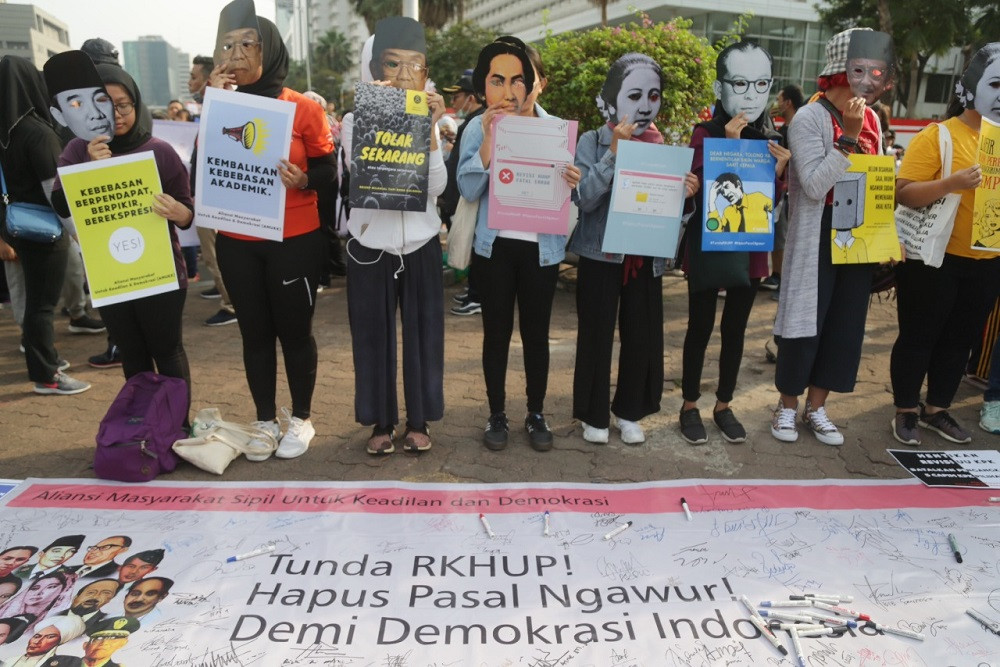Popular Reads
Top Results
Can't find what you're looking for?
View all search resultsPopular Reads
Top Results
Can't find what you're looking for?
View all search resultsColonial legacy: The (un)making of the Criminal Code
With the proposed amendment of the Criminal Code, there is no guarantee that everyone will be free from being criminalized for practicing their cultural beliefs.
Change text size
Gift Premium Articles
to Anyone
O
ur founding fathers were too busy defending and establishing allies after the independence of Indonesia. Their strategic visions for the nation’s freedom from all forms of colonial power were cut short.
They may have physically gotten rid of the Dutch and Japanese and established a new nation, but they were of the view that it was perfectly acceptable to adopt the Dutch Criminal Code in 1958 to avoid a legal vacuum.
Our founding fathers took the view that legal dualism embedded in the practice of 200 years of Dutch colonialism had proved that the Dutch Criminal Code we inherited could live in tandem with our distinctly unique living law.
This view of legal dualism has shaped generations and has become onerous now. The concept of bhinneka tunggal ika (unity in diversity), although it is seen as Indonesia’s version of democracy, reinforces the colonial creation in the form of a labyrinth of legal systems: the Criminal Code and the variety of indigenous legal systems.
They segregated the colonists, their subjected natives and everyone in between. There is more unity in that term than the actual diversity.
The current proposed revision of the colonial Criminal Code pertaining to the living law section has triggered a widespread outcry from civil society. Article 2(1) and Article 598 of the draft, which recognize that traditional criminal justice system that has been in place in societies, violates the doctrine of legality and is instinctively draconian. Civil society members believe that leaving the legal interpretation of what constitutes living law to decentralized governments will not only diminish the rights of indigenous peoples but will also be at risk of being applied inconsistently and discriminatively.
Ironically, it criminalizes our bhinneka tunggal ika, which glues us together regardless of our understanding of the genealogy of the term.
The ongoing debates on rationalizing the duality of our colonial Criminal Code and living law keep regenerating, and it has become part of our intergenerational trauma. As a postcolonial nation, the only prominent experience we share with other indigenous peoples in the archipelago is that we were the subjects of colonialism.
The legal dualism of colonial legacy has had divided us: the Criminal Code for the Europeans and the diverse living law for the natives. Under the colonial gaze, we were "plural" until we became criminal. That’s when the colonial Criminal Code came to power and trampled our unique diversity.
The one thing we can learn from the colonial practice of legal dualism is that as long as our pluralism stays private and does not challenge the economic activities of the rich and the powerful, the Criminal Code will not touch us.
With the proposed amendment of the Criminal Code, there is no guarantee that everyone will be free from being criminalized for practicing their cultural beliefs. This inherent colonial view is, unfortunately, being exercised by our policy makers. Hence, the colonial legacy continues.
As a matter of postcolonial agency, our understanding of ourselves and our identities could be easily obscured by the unconscious colonial trauma we share. This could also be worsened by the embedded Eurocentric way of thinking that we have been exposed to on social media. Some people are more self-aware than others.
That is why it is necessary to revisit the impacts of colonialism on postcolonial politics in the Criminal Code debates.
Last week the government proposed to the House of Representatives that revision of the Criminal Code be included in the national legislation program for this year. The House delayed passing the new Criminal Code in 2019 because of public protests.
Debates on decolonizing the Criminal Code require a genuine conversation that highlights people's perspectives that came before us. Prof. Soepomo and Prof. Mohammad Koesnoe were important scholarly figures in Indonesia's unique legal development. They were strong advocates for the adoption of adat (customary) law as the foundation of our legal system.
They argued that this reflected the collective values of our society, compared to the Dutch Criminal Code, which was inherently individualistic.
The late Soepomo and Koesnoe rejected the idea of separation between law and the Criminal Code. They argued that this classification was inherently misleading because any legal system must encompass norms and values.
Adat law is the normative foundation of our legal system and not the Dutch Criminal Code. Adat law reveals who we are as a society and not the Dutch Criminal Code, a product of European civilization.
The two new sections proposed in the draft Criminal Code pertaining to the living law do not reflect the values and diversity of Indonesian societies. We want sovereignty and not colonial complicity.
***
The writer is a lawyer and international human rights advocate.










